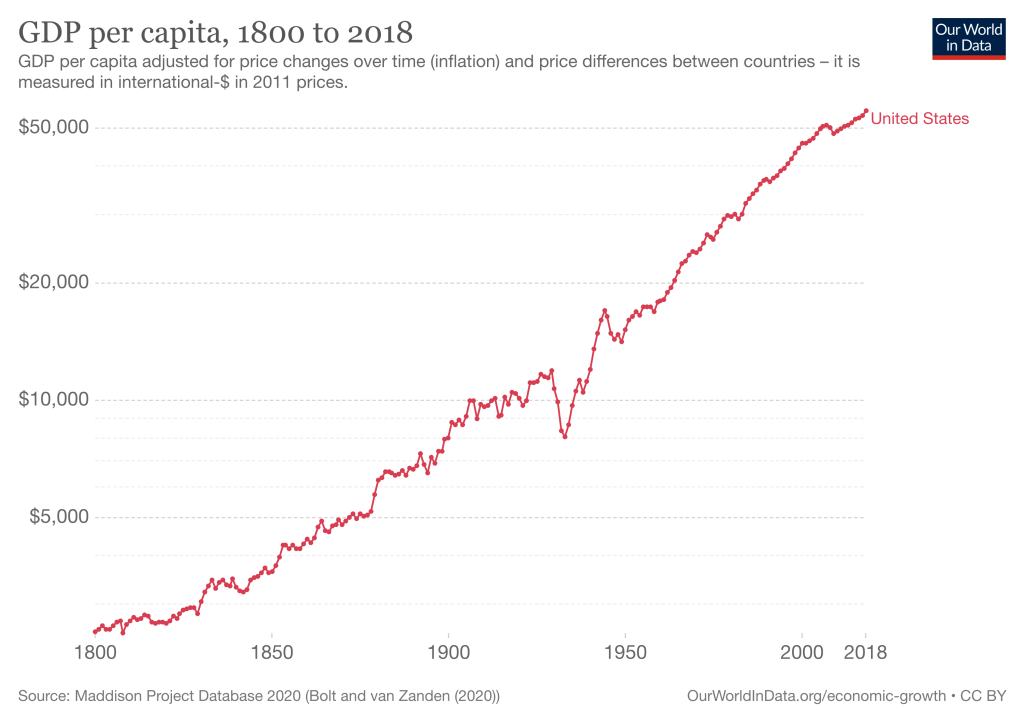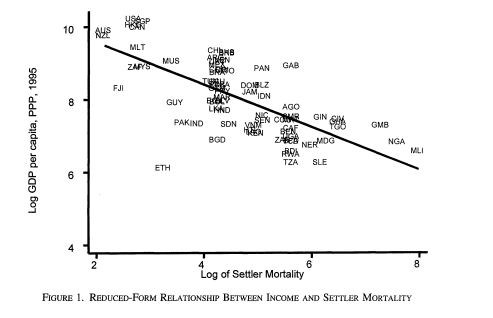How much of economic development is determined by long-run historical forces, and how much of it by contingent leaders, thinkers, and events? I originally took these notes for an entry to an economics contest. They’re not rigorous in any way, but I thought it might be of interest to people on the forum. I originally posted this on my personal website.
Persistence and institutions
- There are several results mentioned in this post where I have read common conclusions by authors who posit different explanatory mechanisms. Extracting causal relationships is really hard, and as usual, you shouldn’t trust studies whose statistical methods are too complex. Keep in mind that a lot of this literature has run into significant replication problems.
- One attempt to measure the effect of long-run history found that 78% of the variance of wealth today is explained by a country’s technological sophistication in 1500AD. The regions that were rich in 1000BC even have predictive power for the regions that are rich today, insofar as that can be measured. So, countries that are on a historical path of prosperity tend to stay prosperous, and countries that are on a historical path of poverty tend to stay poor. It is not so much a country’s historical path that is of greatest significance, but its population’s historical path. People descended from those who lived in more advanced civilisations have better economic outcomes today, even if they have migrated. The differential success of various people groups is (presumably) because they bring with them their political institutions, technologies, capital, and culture. High-quality institutions are key to economic development – two examples being the diverging fates of the two Koreas, and of African countries after being carved up by colonialism.
- The importance of historical paths in economic development appears to imply that some cultural values persist for hundreds or thousands of years. However, the fact that much of current prosperity is explained by a history of prosperity is only a proximate, and not an ultimate, explanation. A people group with a history of strong social institutions had those institutions for a reason. What determines which countries have a strong history of state formation to begin with?
- A major problem with this ancestral account is that it fails on the three most prominent examples. Ancestry would anticipate that India and China would do extremely well, and that America’s development would be so-so. In general, a lot of this research is very dependent on outliers: some of the Africa results disappear, for example, when you take out Nigeria or one or two other countries.
- Another famous result is that groups that historically adopted plough-based agriculture have less egalitarian gender norms and lower female labour-force participation today. This is because the plough relies on upper-body strength to a greater extent than other methods of farming, creating a larger division between the role of men and women. These attitudes persist even if you look at children of immigrants, raised in Europe and the United States.
Growth and inequality
- Long-run history is potentially very significant in determining relative wealth, but a priori we should be more surprised to see persistent growth effects. After all, pooper countries can import technologies from richer ones to make them more productive. Moreover, persistent differences in wealth between countries is less big of a deal in a regime of long-term growth. Indeed, in politically stable places the growth rate of GDP is relatively insensitive to long-run history. The norm since the industrial revolution has been a 1-1.5% growth rate excluding the effects of a growing population (more from Nintil). Deviations from this norm are explained by temporary bubbles, countries recovering from wars and unproductive economic systems like communism, and countries like those in East Asia achieving catch-up growth by adopting Western technologies. One or more of these conditions was true of most countries in the 20th century, but they were all anomalous in some way. 1-1.5% real per capita growth has been the norm at the technological frontier. So, here we will not expect to see the persistent historical effects as strongly, except insofar as they make a country more likely to go to war or have advanced technology.

Does reality drive straight lines on graphs, or do straight lines on graphs drive reality? Source
- What about inequality? One relevant fact documented in the literature is that the ancestral heterogeneity of a country’s population is strongly correlated with income inequality today. However, income inequality is largely a political issue, being shaped by short-term economic policies, which is difficult to explain with a long-term historical path.
- In looking at inequality, esoteric points about the calculation of inflation are actually surprisingly important. This may or may not be the cause of the wage decoupling phenomenon: technology means that the efficiency of businesses grows faster than the productivity of its employees, the CPI measures price changes in consumption, and so the inflation calculation potentially masks solid middle-class gains. According to some economists, if you measure income inequality including taxes and transfers, it has not even been rising in the US since the 1970s! Russ Roberts would also point out that some studies measure household income and others measure individual income, and so changes in family structure (e.g. increase in divorce) look like decreases in wealth.
- This broad question of “Why are some countries rich and others poor?” is the nominal subject of Smith’s The Wealth of Nations. But there was a lot less to explain in his day: the richest countries were only 4-5x richer than the poorest ones, while today the richest countries are 100x richer than the poorest ones.
Geography
- Economic outcomes are positively associated with being coastal, far away from the equator, and being an island. The tropics predict worse outcomes, among other things, because of the prevalence of diseases like malaria, and because worker productivity is lower when the weather is very hot. Guns, Germs and Steel also famously argued for the importance of the distribution of domesticable species (Eurasia has many, Africa has almost none), and the orientation of the continents (Eurasians could spread inventions and cultures east-west to similar climatic zones, while Africans and the indigenous Americans couldn’t).
- One of the reasons Africans disproportionately settled in geographically unfavourable conditions is slavery: people moved to areas where it was difficult for them to be captured. Nathan Nunn has a paper in which he shows that countries were benefitted by their rugged geography insofar as it allowed their citizens to escape capture.
- This persistence research has been taken as an argument for scepticism about immigration, for instance by Garrett Jones. But there is another way of looking at the research which makes a pro-immigration case: namely that there are significant benefits from just moving people around. Here Caplan does the naive calculations of the gains from doing this.
Colonialism
- Colonialism left lasting economic effects, yet the mere status of having been colonised does not explain very much of modern economic outcomes. Former European colonies vary from low-income (Zimbabwe) to middle-income (Brazil) to high-income (New Zealand). So, what in history explains these differences? One factor is slavery. Colonies that had more slaves taken from them now perform worse economically and have higher levels of mistrust, and the relationship appears to be causal. A famous result is that former colonies saw a “reversal of fortune” – the richer a country colonised by Europe was in 1500, the more likely it is to be poorer now, and vice versa. The proposed reason for this, as I understand it, is that Europeans were more likely to introduce institutions that encouraged investment in poorer regions, and to simply extract labour and resources from the richer ones. An optimistic view is that extractive institutions are there because of mistakes, or bad judgement, but in fact, it is probably rational for elites to set up such institutions to enrich themselves at the cost of long-run growth. For instance, North American colonists (e.g. the Virginia Company) tried to set up extractive institutions, but failed, while their South American counterparts were more successful. North American colonists struggled to enslave local people through a combination of low population density, lack of political centralisation, and lots of wide-open spaces from which they could be ambushed. My understanding is that they then settled for a system based on individual rights (for those other than the imported slaves, of course).
- This paper argues that the “reversal of fortunes” result is true for countries but not for ethnicities: being a successful people group in 1500 predicts success today. There are also other ways in which the result is fragile.
- Melissa Dell has a paper in which she shows that areas in Vietnam with stronger government before colonialism are richer today. North Vietnam appears to be poorer for this reason, despite the benefit of having more ethnic Chinese (the proportion of ethnic Chinese predicts prosperity in Southeast Asia relatively well). In the aforementioned regions where local government is historically stronger, you see higher social capital, people default less often on loans, etc.
- Another possible key feature in colonies’ historical paths was settler mortality. Europeans who arrived in hot climates with diseases to which they did not have immunity spent minimum time there and established extractive institutions – i.e. those aimed at conferring the profits of resources and labour to a small elite. Where mortality was similar to the levels in Europe, settlers established better quality, more inclusive, institutions. This factor alone has been calculated to explain 25% of the variance in the quality of current institutions. This is a partial explanation as to why temperature and proximity to the equator remain so important in a world with air conditioning: in places that were hot and perilous, colonists set up extractive institutions that remain to this day.

Conclusion
- This research still leaves room for single individuals, and indeed chance, to play a big part in economic development. Mao and Hitler are two obvious examples of individuals who have shaped economic history in a way that cannot be explained by broad societal trends. We cannot run history over to see how things could have gone differently. Moreover, the last two centuries have seen the floor of poverty rise dramatically, and so even if relative poverty were historically predetermined, good economic policy would still stand to cause huge improvements in the standard of living.
- Some articles I recommend on this topic: Ben Kuhn’s post on the longtermist view of global poverty, and Bryan Caplan’s reading club. See also the Conversations with Tyler with Nathan Nunn and Melissa Dell. The famous book on this topic is Why Nations Fail, and its authors (Acemoglu and Robinson) are giants in the field who I linked to several times in this post.
Thanks to Leopold Aschenbrenner, Gytis, and Cian Mullarkey for comments on drafts of this post.
